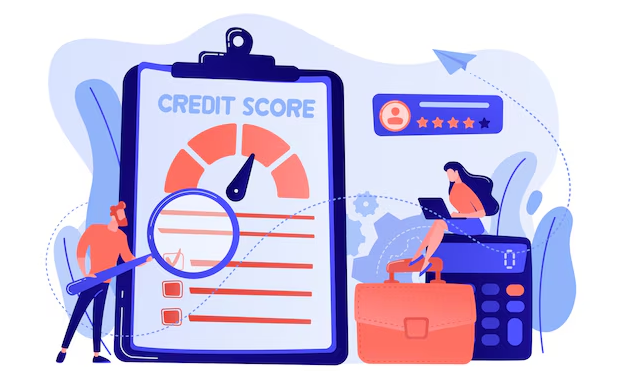When preparing to apply for a loan in the United States, your credit score plays a pivotal role in determining not only your eligibility but also the terms of your loan. A higher credit score can lead to lower interest rates and better repayment terms, saving you significant money in the long run.
Understanding how to improve your credit score before submitting a loan application can be a game-changer. Let’s explore effective strategies to elevate your creditworthiness.
Understand the factors influencing your credit score

The first step to improving your credit score is understanding how it is calculated. Credit scores in the U.S. are primarily determined by five key factors: payment history, credit utilization, length of credit history, credit mix, and new credit inquiries. Each of these components carries a different weight, making it essential to focus on the ones with the greatest impact.
Payment history, which accounts for about 35% of your score, is the most critical factor. It reflects whether you have consistently paid your bills on time. Late payments or defaults can severely damage your score, so addressing any past-due accounts should be a priority.
The length of your credit history, which makes up about 15% of your score, highlights the benefits of maintaining older accounts. A longer credit history demonstrates stability and reliability. In addition, having a diverse credit mix (10%)—such as credit cards, installment loans, and mortgages—can also positively influence your score. Finally, new credit inquiries, which also contribute 10%, should be minimized as multiple applications for new credit within a short period can lower your score.
Address errors on your credit report
One often-overlooked step in improving your credit score is reviewing your credit report for errors. Mistakes on your report, such as incorrect account balances or inaccurately reported late payments, can negatively impact your score. By addressing these errors promptly, you can ensure that your credit profile accurately reflects your financial behavior.
To begin, request a free copy of your credit report from the three major credit bureaus: Experian, Equifax, and TransUnion. Under U.S. law, you are entitled to one free report annually from each bureau. Carefully review each report for discrepancies and document any errors you identify. Common mistakes include accounts listed as delinquent despite being paid on time or accounts that do not belong to you.
If you find errors, dispute them directly with the credit bureau. Provide supporting documentation, such as payment records or correspondence with creditors, to strengthen your case. The bureau is required to investigate your claim within 30 days and either correct or verify the information. Addressing inaccuracies on your report can lead to immediate improvements in your credit score.
Prioritize paying down high-interest debt
Another effective way to boost your credit score is by reducing your overall debt, particularly high-interest balances. High levels of debt can negatively affect your credit utilization ratio, which is a critical component of your score. By strategically paying down these balances, you can improve both your financial health and credit profile.
Start by focusing on credit cards with the highest interest rates, as these accounts are the most expensive to carry over time. Making larger payments on these balances not only reduces your overall debt but also demonstrates responsible financial behavior to creditors. If you’re struggling to make significant progress, consider exploring options like debt consolidation or balance transfer cards to lower your interest rates and simplify payments.
In addition to reducing credit card balances, it’s essential to stay current on all other debt obligations, including student loans, car loans, and mortgages. Even if you cannot pay off these loans in full, consistently making on-time payments will have a positive effect on your payment history and overall creditworthiness.
Avoid opening new credit accounts unnecessarily
While it may be tempting to open new credit accounts to increase your available credit or take advantage of promotional offers, doing so can have unintended consequences. Each new credit application results in a hard inquiry on your report, which can temporarily lower your score.
It’s essential to be strategic about opening new accounts, particularly in the months leading up to a loan application. Before applying for new credit, consider whether it aligns with your financial goals and if it will improve your overall credit profile. For example, opening a secured credit card or a credit-builder loan may be beneficial if you’re establishing or rebuilding credit.
However, refrain from applying for store credit cards or other accounts that you don’t truly need. The minor boost in available credit may not outweigh the negative impact of the hard inquiry, especially if your credit score is already on the lower end. Instead, focus on managing your existing accounts responsibly to strengthen your creditworthiness over time.
Develop a long-term credit improvement strategy
Improving your credit score is not a quick fix but rather a process that requires consistent effort and financial discipline. Developing a long-term strategy can help you maintain a healthy credit profile not just for your upcoming loan application but for future financial goals as well.
One key aspect of a sustainable strategy is establishing a realistic budget. By tracking your income and expenses, you can ensure that you have enough resources to cover all your financial obligations on time. This proactive approach minimizes the risk of late payments, which are detrimental to your credit score. Automating your payments can also help you stay consistent.
Another important practice is periodically monitoring your credit report and score. Regular monitoring allows you to track your progress and identify any changes that may require attention. Several online tools and services offer free credit score updates and alerts for significant changes, helping you stay informed.
Finally, educate yourself about credit management and financial literacy. Understanding how credit works and the factors that influence your score can empower you to make informed decisions. Whether through books, online courses, or professional advice, enhancing your knowledge will serve as a foundation for better financial habits in the future.
Conclusion
Improving your credit score before applying for a loan in the U.S. involves a combination of strategic actions and long-term commitment. By understanding the factors that influence your score, addressing errors, reducing debt, avoiding unnecessary new accounts, and adopting a sustainable approach, you can significantly enhance your creditworthiness. These efforts not only increase your chances of securing a loan but also lay the groundwork for a healthier financial future.


